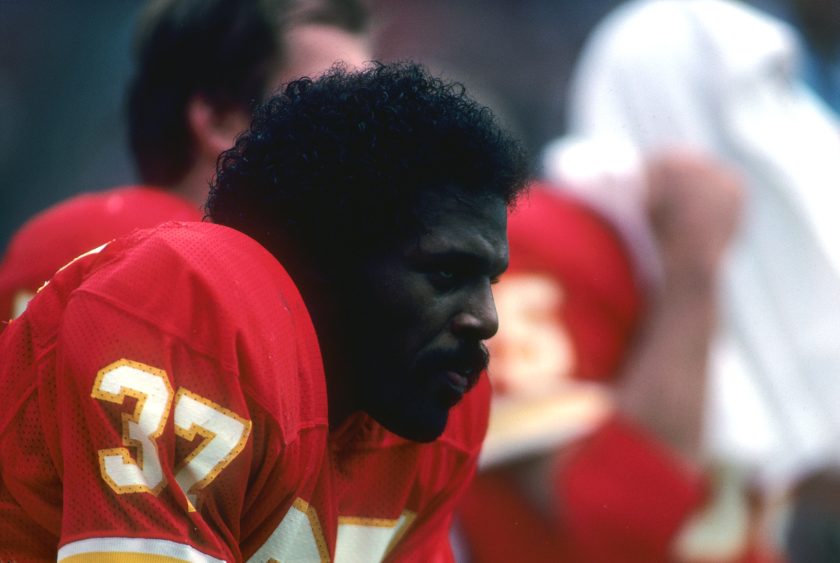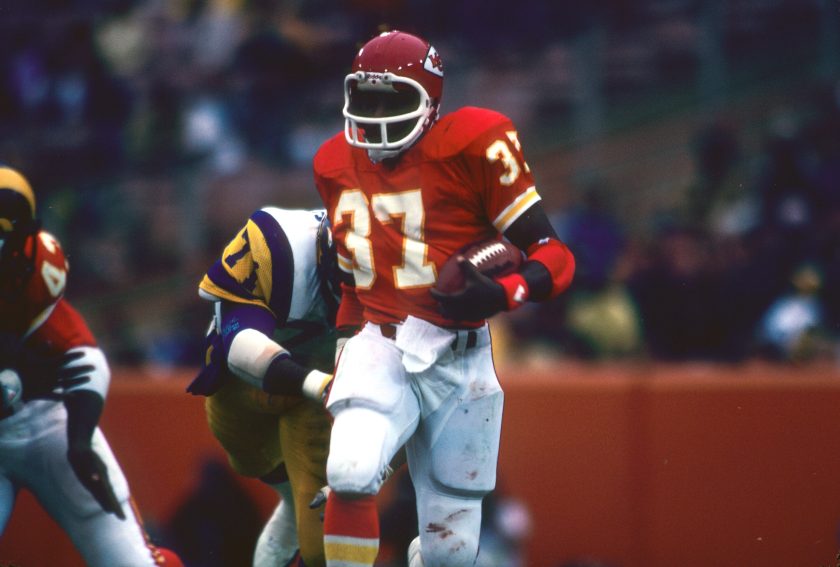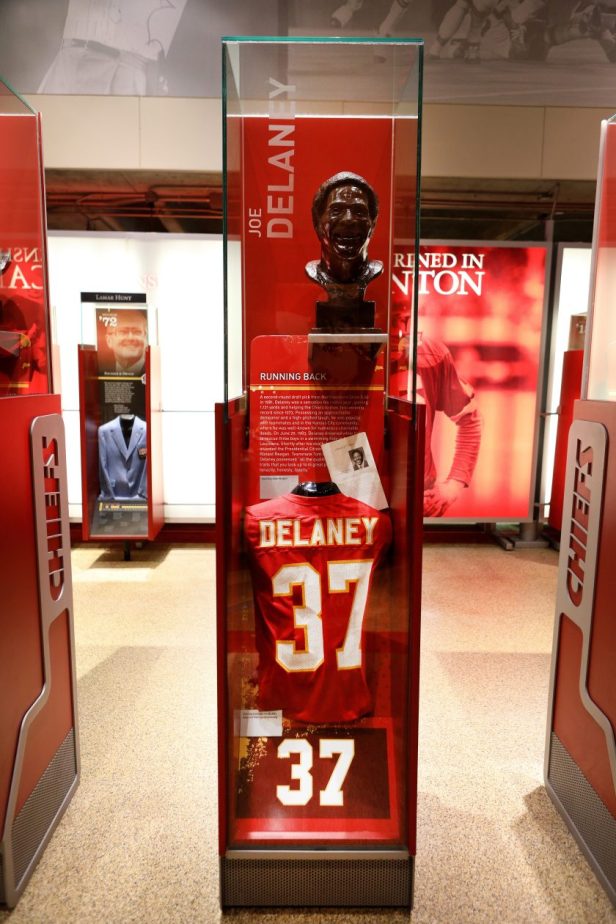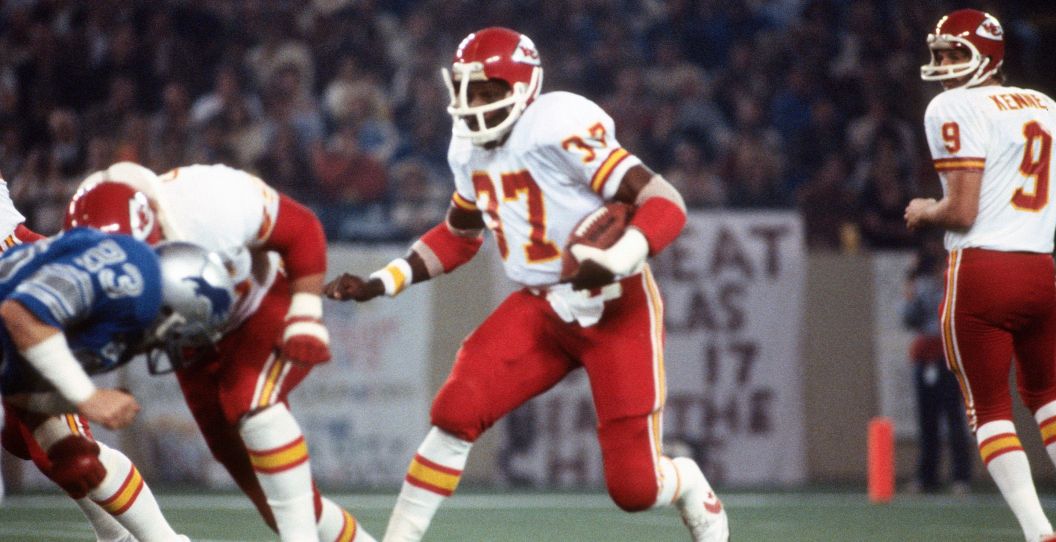No matter what, it's always tragic when a professional athlete dies during their career (or after, for that matter). From Sean Taylor to Derrick Thomas or anyone else on the list of athletes that passed away too soon, the NFL world has mourned too many deaths like these.
Videos by FanBuzz
Some get remembered as heroes. Former Arizona Cardinals safety Pat Tillman, for example, ended his NFL career to join the United States Army and died serving in Afghanistan. However, right next to Tillman's name should be Joe Delaney, a former Kansas City Chiefs star running back who died at 24 while attempting to save the lives of three children from drowning.
Forty years ago today, Delaney died a hero.
Who Was Joe Delaney?

Photo by Peter Read Miller /Sports Illustrated via Getty Images
Joe Alton Delaney was born in Henderson, Texas, but attended Haughton High School in Haughton, Bossier Parish, Louisiana. Against the wishes of his father, Woodrow Delaney, he played wide receiver in high school.
Division I schools like Texas, Oklahoma, Louisiana State and Grambling State all gave him looks as a recruit, but he ultimately furthered his football career for the Division I-AA Northwestern State Demons in 1977.
Delaney transitioned to running back at Northwestern State with ease. Twice he was named an All-American. He closed the book on his collegiate career with 3,047 rushing yards and 31 touchdowns. In one game against Nicholls State, he tallied four touchdowns and set the NCAA record for second-half rushing yards (263). In his final game, the school retired his No. 44 jersey at halftime.
It was no secret the 5-foot-10 speedster had lightning quickness. He flashed his straight-line speed on the track at Northwestern State, too, winning the NCAA 400-meter relay in 1981.
He was one of the greatest players to step foot on a Division I-AA school. In 1997, Delaney was elected and immortalized into the College Football Hall of Fame.

Photo by Peter Read Miller /Sports Illustrated via Getty Images
The Kansas City Chiefs took Delaney in the second round of the 1981 NFL Draft, and he broke out instantly as a rookie Pro-Bowl selection that season.
He rushed for 1,121 yards and set four franchise records as a 23-year-old newcomer that won United Press International's AFC Rookie of the Year award. He wowed fans in his first NFL action, coming off the bench for 101 yards against the New England Patriots.
Then in his first professional start, he gained 106 rushing yards and 104 receiving yards against the Oakland Raiders. He also owned that season's longest rushing play, an 82-yard touchdown against the Denver Broncos.
After Delaney tore up the Houston Oilers defense for 196 yards in 1981, Oilers defensive end and Pro Football Hall of Famer Elvin Bethea had this to say about the young running back:
"I've played against the best — O.J. Simpson, Gale Sayers, Walter Payton and (Delaney) ranks right up there with them. He is great with a capital G."
For the first time since 1973, the Chiefs (9-7) posted a winning season. Delaney was a massive reason why.
Delaney's second season in '82 didn't quite live up to expectations, but then again, neither did anyone's that year.
A player strike shortened the season from 16 games to nine. To make matters worse for Delaney, he had eye surgery to repair a detached retina. Delaney ended his short-lived career with 1,501 rushing yards, 299 receiving yards and three touchdowns.
Joe Delaney's Tragic Death

Photo By Raymond Boyd/Getty Images
RELATED: Steve McNair's Death Left Behind a Family Who Now Makes Him Proud
Delaney was a good guy. He helped others in need and had a humanitarian-type outlook. One time, he paid for the entire funeral of a former teacher of his after hearing the family couldn't afford it.
He was exactly the type of person that didn't deserve to die when he did.
It's June 29, 1983. Delaney is living in Ruston, Louisiana, which sits about an hour east of Haughton. He loved children and decided he'd take a group of local kids for a full day of fun as part of a "Kids Day" sponsored by a TV station.
Off they headed for Monroe's Chennault Park, where an amusement park called Critter's Creek awaited them. According to accounts, Delaney heard screams from three panicking children in a water hole created by recent construction that should've been fenced off.
Though Delaney himself didn't know how to swim, he jumped in and put his life on the line trying to save them. Delaney, along with another boy, drowned in the attempt. One was able to swim to shore safely and another died later in the emergency room.
I was 11. Had a newspaper route. Huge NFL fan. I remember reading about Joe Delaney’s death and being moved. Shocked. He died a hero. Couldn’t swim but tried to rescue 3 boys. I’m a lifelong @dallascowboys fan but I like the @Chiefs bc of THIS HERO. pic.twitter.com/nja5dLZJ81
— Will Tran (@KRON4WTran) January 8, 2019
Police diver Marvin Dearman recalls trying to save Delaney's life. He jumped in well after Delaney had and pulled him out with hopes of reviving him. It was too late. He was pronounced dead at St. Francis Medical Center.
"They didn't have cell phones then, and this was in a park where there wasn't a real abundance of any kind of phones," Dearman told the Kansas City Star. "We don't know how long it took somebody to run to a pay phone to call the police. We didn't even have 911 at the time."
Thousands showed up for Delaney's funeral service on July 4 at Haughton High School. President Ronald Reagan posthumously awarded him the Presidential Citizens Medal for his ultimate sacrifice, calling the NFL player a "supreme example of courage and compassion." Vice President George H.W. Bush presented his family with the honor.
He was the definition of a true hero.
The Chiefs wore a patch during the 1983 season to commemorate their fallen teammate. Delaney's jersey number, 37, was never retired but hasn't been worn since his death.
In the wake of his death, a group of Chiefs fans formed the "37Forever Foundation" to help provide swimming lessons for underprivileged youth. Haughton's Joe Delaney Memorial Park was renamed after him.
Carolyn Delaney at the memorial for her husband, Joe Delaney. The memorial was unveiled today at Joe Delaney Memorial Park in Haughton. pic.twitter.com/kMiBl7LqRt
— Amanda (Crane) Simmons (@Amanda_BPCC) October 30, 2016
Delaney's legacy lives on forever at Arrowhead Stadium, where his name is included in the team's ring of honor. In 2004, he was elected to the Kansas City Chiefs Hall of Fame.
Delaney's wife, Carolyn, struggled with her husband's death. They grew up a few blocks from each other and wedded while Delaney was still in college. They had three daughters, and suddenly Carolyn was left alone to take care of them.
All three of them went to college thanks to financial help from the NFL, which has supported Carolyn since Delaney's death.
"Joe died how he lived. Joe was a kind-hearted person," she told the Kansas City Star. "He would always help no matter what the situation was."
ESPN ran a 30 for 30 on Delaney and Sports Illustrated's Rick Reilly once wrote a piece on Delaney titled "No Ordinary Joe." I can't think of a better way to describe a man who put the most important things in his life on the line — his wife, his daughters, his career — to try to save those boys. But then again, he might not have been able to live knowing he didn't do all he could to help that fateful day.
As you watch the NFL stars of today like Chiefs quarterback Patrick Mahomes, and tight end Travis Kelce play, take a minute to stop and remember the heroes of yesterday like Joe Delaney.
